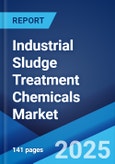Industrial sludge is a byproduct of industrial wastewater treatment processes. It is a mixture of water, solids, and other contaminants that need to be treated before being disposed of or reused. It uses various chemicals to treat the sludge, such as flocculants, coagulants, disinfectants, and pH adjusters, to reduce the potential for corrosion. Industrial sludge treatment chemicals aid in improving the dewatering of sludge, separating water from solids, reducing odor, enhancing stability, and making it less prone to degradation and decomposition. They also help recover nutrients from sludge, which can be further used in fertilizer for soil conditioning to prevent the need for synthetic fertilizers and improve the overall health of the soil.
Industrial Sludge Treatment Chemicals Market Trends:
Due to increasing environmental concerns, several initiatives are being undertaken by governments of numerous countries to promote the treatment of industrial sludge in numerous industry verticals. They are also focusing on taking measures to launch effective and sustainable waste management programs. This, coupled with the growing population and rapid industrialization, represents one of the major factors driving the demand for industrial sludge treatment chemicals around the world. Moreover, the rising use of natural and biodegradable chemicals in sludge treatment to minimize the harmful impact on the environment is favoring the market growth. In addition, the growing awareness among individuals about the benefits of using chemicals for sludge disposal and improving water conservation activities by municipal corporations is influencing the market positively. Apart from this, the increasing number of wastewater treatment plants and the rising consciousness among consumers about the adverse impacts of pollutants are contributing to the market growth. Furthermore, the growing need for fertilizers on account of the surging demand for food is creating a positive outlook for the market. Besides this, there is a rise in the advent of high-performance industrial sludge treatment technologies, such as membrane filtration, thermal hydrolysis, and anaerobic digestion, that help filter out contaminants from sludge. They also use high pressures and temperatures to break down the organic matter in sludge and produce biogas. These innovations are anticipated to strengthen the growth of the market.Key Market Segmentation:
This report provides an analysis of the key trends in each segment of the global industrial sludge treatment chemicals market, along with forecasts at the global, regional, and country level from 2025-2033. The report has categorized the market based on sludge type, process chemical, process treatment, and end user.Sludge Type Insights:
- Activated Sludge
- Primary Sludge
- Mixed Sludge
- Others
Process Chemical Insights:
- Flocculants
- Coagulants
- Disinfectants
- Others
Process Treatment Insights:
- Conditioning and Stabilization Treatment
- Dewatering and Drying Treatment
- Thickening Treatment
- Digestion Treatment
End User Insights:
- Food and Beverages
- Personal Care
- Chemicals
- Pulp and Paper
- Municipal Wastewater
- Others
Regional Insights:
- North America
- United States
- Canada
- Asia-Pacific
- China
- Japan
- India
- South Korea
- Australia
- Indonesia
- Others
- Europe
- Germany
- France
- United Kingdom
- Italy
- Spain
- Russia
- Others
- Latin America
- Brazil
- Mexico
- Others
- Middle East and Africa
Competitive Landscape:
The report has also provided a comprehensive analysis of the competitive landscape in the global industrial sludge treatment chemicals market. Detailed profiles of all major companies have also been provided. Some of the companies covered include Accepta Ltd, Amcon Inc., Beckart Environmental Inc., Ecolab Inc., Hubbard-Hall, Kemira Oyj, Kurita Water Industries Ltd., OVIVO (SKion Water GmbH), Veolia Water Technologies (Veolia Environnement S.A.), etc.Key Questions Answered in This Report:
- How has the global industrial sludge treatment chemicals market performed so far, and how will it perform in the coming years?
- What are the drivers, restraints, and opportunities in the global industrial sludge treatment chemicals market?
- What is the impact of each driver, restraint, and opportunity on the global industrial sludge treatment chemicals market?
- What are the key regional markets?
- Which countries represent the most attractive industrial sludge treatment chemicals markets?
- What is the breakup of the market based on the sludge type?
- Which is the most attractive sludge type in the industrial sludge treatment chemicals market?
- What is the breakup of the market based on the process chemical?
- Which is the most attractive process chemical in the industrial sludge treatment chemicals market?
- What is the breakup of the market based on the process treatment?
- Which is the most attractive process treatment in the industrial sludge treatment chemicals market?
- What is the breakup of the market based on the end user?
- Which is the most attractive end user in the industrial sludge treatment chemicals market?
- What is the competitive structure of the global industrial sludge treatment chemicals market?
- Who are the key players/companies in the global industrial sludge treatment chemicals market?
Table of Contents
Companies Mentioned
- Accepta Ltd
- Amcon Inc.
- Beckart Environmental Inc.
- Ecolab Inc.
- Hubbard-Hall
- Kemira Oyj
- Kurita Water Industries Ltd.
- OVIVO (SKion Water GmbH)
- Veolia Water Technologies (Veolia Environnement S.A.)








